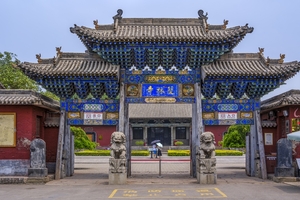Tech Roundup: PDD’s Bare-Knuckle Tactics Upend E-Commerce Landscape, SMIC Accelerates Capacity Buildout as Chip War Intensifies
Listen to the full version

Welcome to the Tech Roundup — a briefing of the top technology news making headlines in China and the rest of Asia.
PDD’s bare-knuckle tactics upend e-commerce landscape
Outside of China, Temu is ubiquitous. Many know it as the online cheap goods market that came out of the blue, flouted consumer concerns about wasteful fast fashion, and bought ads everywhere from Instagram to the Superbowl, telling viewers they should fill up their wardrobes and “Shop Like a Billionaire.”

Download our app to receive breaking news alerts and read the news on the go.
Get our weekly free Must-Read newsletter.
- DIGEST HUB
- PDD Holdings' e-commerce platform Temu faces protests from Chinese merchants over hefty fines, despite its success in global markets.
- Temu founder Colin Huang regains the title of China's richest person with a $48.6 billion fortune, driven by PDD's successful international expansion.
- Intel introduces a new AI-enhanced graphics chip for Chinese EVs, while SMIC accelerates capacity in response to tech restrictions, and Malaysia collaborates with China on semiconductor development.
The Tech Roundup provides an overview of prominent technology news in China and Asia [para. 1]. The briefing begins with a story about Temu, the international brand of PDD Holdings Inc., known for its affordable online marketplace and aggressive advertising strategies. Outside China, Temu has a strong presence, noted for its campaigns on platforms like Instagram and the Superbowl [para. 2]. However, in China, Temu has recently come under scrutiny due to merchant protests in Guangzhou. These merchants accuse it of imposing "after-sales fines" for product defects without substantiating such claims [para. 3]. Temu's parent company, PDD Holdings Inc., a well-known player in the Chinese e-commerce sector, only entered the market in 2015. It managed to become the most valuable e-commerce firm by leveraging group-buying and gamification tactics, even overtaking Alibaba Group Holding Ltd. last year [para. 4]. Despite its achievements, PDD faces criticism for harsh pricing strategies and dubious penalty systems, which are reportedly detrimental to merchants and disrupting the industry. For instance, data from a group of 100 Temu sellers indicate that the company has exacted fines totaling 142 million yuan. Other allegations point to a recommendation system that supports intellectual property infringement [para. 5].
Meanwhile, Pinduoduo's founder Colin Huang has re-emerged as China's richest person, as per the Bloomberg Billionaires Index. His fortune, which had plummeted by 87% due to the economic fallout from the COVID-19 pandemic and China's regulatory crackdown on private sectors, saw a reversal due to PDD Holdings Inc.'s international growth under the Temu brand. Huang's wealth is now estimated at $48.6 billion, surpassing bottling tycoon Zhong Shanshan [para. 7][para. 8][para. 9].
In another significant development, U.S. tech giant Intel has launched a new discrete graphics processing unit (GPU) designed specifically for electric vehicles (EVs) in China. The Intel Arc Graphics for Automotive aims to be commercially available by next year and promises to enhance the AI-driven cockpit experience and personalization features. This GPU adds to Intel's range of AI-enhanced automotive chips [para. 10][para. 11][para. 12].
Additionally, Semiconductor Manufacturing International Corp. (SMIC) is accelerating its capacity building in response to increasing restrictions by a U.S.-led multinational campaign that limits China’s access to advanced technologies. According to SMIC Co-CEO Zhao Haijun, the company is advancing at a faster pace than initially planned, motivated by geopolitical shifts in supply chains [para. 13]. The Chinese government has been urging companies to use domestically developed products to achieve self-sufficiency in strategic areas such as automotive chips. Although Zhao did not specify any customers, Huawei Technologies Co. Ltd. is implied to be a significant partner, especially after collaborating with SMIC to produce a 7-nanometer processor for its Mate series last year [para. 14][para. 15].
Finally, Malaysia and China are enhancing their collaboration in the semiconductor sector through the first Asia-Pacific Semiconductor Summit and Expo, planned for October in Penang, Malaysia. The event is organized by the Malaysia Semiconductor Industry Association and the China Electronic Production Equipment Industry Association. It aims to bolster Malaysia's chip industry and strengthen Beijing’s supply chains. Malaysian exhibitors are expected to constitute around 40% of the participants, with 30% coming from China and the remaining 30% from other regions [para. 16][para. 17][para. 18][para. 19].
- PDD Holdings Inc.
- PDD Holdings Inc., founded in 2015, is a leading Chinese e-commerce firm known for its app Pinduoduo and recently its international platform Temu. It has overtaken Alibaba's market value by capitalizing on group-buying culture and gamified shopping experiences. However, the company faces criticism for aggressive pricing strategies and controversial penalties on merchants, disrupting the e-commerce landscape. Colin Huang, its founder, has regained the title of China’s richest person driven by Temu's international success.
- Temu
- Temu, a subsidiary of Nasdaq-listed PDD Holdings Inc., is a rapidly growing e-commerce platform known for its aggressive pricing and advertising strategies. Outside China, Temu gained attention for promotional campaigns, while in China, it faced criticism for imposing hefty fines on merchants. Despite controversies, its growth helped its founder Colin Huang reclaim the title of China's richest person.
- Intel Corp.
- Intel Corp. has introduced a new discrete graphics processing unit, the Intel Arc Graphics for Automotive, for the Chinese EV market. This chip, expected to be commercially deployed next year, aims to enhance the AI-driven cockpit experience and personalization for manufacturers and drivers. It is part of Intel's AI-enhanced software-defined vehicle system-on-chips portfolio.
- Semiconductor Manufacturing International Corp. (SMIC)
- Semiconductor Manufacturing International Corp. (SMIC) is accelerating its capacity expansion due to increased geopolitical tensions and U.S.-led technology restrictions on China. Co-CEO Zhao Haijun mentioned that some of their customers, including potentially Huawei, have gained new opportunities due to these supply chain shifts. SMIC is focusing on growing capacity faster than initially planned, with an emphasis on using domestically developed products to achieve self-sufficiency in strategic fields like automotive chips.
- Huawei Technologies Co. Ltd.
- Huawei Technologies Co. Ltd. is a key player in China's efforts to achieve self-sufficiency in strategic fields like automotive chips. The company has collaborated with Semiconductor Manufacturing International Corp. (SMIC) to produce a 7-nanometer processor for its Mate series, rivaling global leaders such as Qualcomm Inc.
- Late last year (2023):
- PDD Holdings Inc. rose to pinch the crown of most valuable e-commerce firm from Alibaba Group Holding Ltd.
- August 8, 2024:
- Intel Corp. announced the introduction of a new discrete graphics processing unit for cars in Shenzhen.
- August 9, 2024:
- SMIC Co-CEO Zhao Haijun mentioned during a post-earnings call that SMIC is growing capacity faster than originally planned.
- PODCAST
- MOST POPULAR





 Sign in with Google
Sign in with Google
 Sign in with Facebook
Sign in with Facebook
 Sign in with 财新
Sign in with 财新